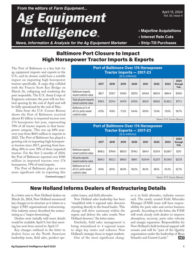Tractors of the future will be a mix of different fuel types and innovative tech, predicts Mike Woollacott, managing director of Greenwatt Technology.
He and several experts at the Low Carbon Agriculture show in the United Kingdom believe reducing emissions and precision farming will be the key drivers behind the shift.
Woollacott expects a steep rise in autonomous tractors and robots on farms and more variation in machinery designed for specific purposes. The machines will be fueled by a mixture of renewable electricity (batteries), hydrogen and biomethane, at least in the short-term. In the future, he says farms will produce their own hydrogen through a process of electrolysis using renewable electricity from solar or wind to split water into hydrogen and oxygen. Currently, electrolysis is too expensive to justify at farm scale.
Advances in the cost and efficiency of batteries and alternative fuels in the automotive industry should spill over into agricultural machinery, according to Neil Wallis at Zemo Partnership, the not-for-profit organization helping to accelerate transport to zero emissions.
“Enabling sustainable farm production — using less energy and inputs — is expected to be a core tenet of future product design," Wallis says. "Farmers will be encouraged to move away from heavier equipment to help reduce soil compaction, allowing fields to absorb and sequester more carbon dioxide from the atmosphere."
Another opportunity for farmers is the evolution of rural charging infrastructure. Agricultural industry could be central to the transformation, according to Lisa Howkins at NFU Energy.
“Research has shown that if we are to meet demand and hit decarbonization targets, the UK needs to be installing 40-50 new chargers every day for the next 10 years,” she says.




Post a comment
Report Abusive Comment